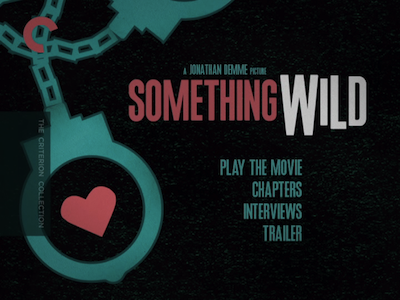
It's true what they say, you know, about how you always remember your firsts.
My sexual awakening can be traced through cinema thusly: I saw my first bra when my dad snuck me into National Lampoon's Animal House
My first pair of boobs was Caddyshack
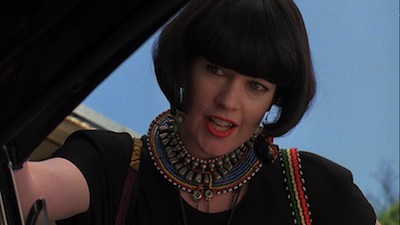
And the first time I remember being turned on by a sex scene in a movie and not grossed out was Something Wild. I was 14 and I managed to catch the off-center comedy on cable after hearing Siskel and Ebert enthuse over the film. It wasn't the first time I had seen sex in a movie--times had changed so much, my dad had taken me to see Scarface
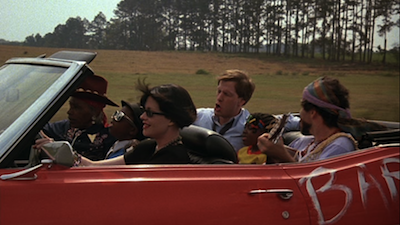
I am now more than twice the age I was when I first saw Something Wild. Hell, I think I'm at least twice the age I was when last I saw it. That VHS is long gone, and so is the quirky time in which a movie like Something Wild could be made without having its weirdo tendencies smoothed out by heavy market research. Melanie Griffith's portrayal of Audrey, a.k.a. Lulu, wouldn't fly anymore. For one, she'd be botoxed and body-doubled to the point of no longer actually looking like a real woman; for another, prevailing mores would dictate she would have to be broken somehow. Audrey predates the coinage of the "manic pixie girl" by nearly two decades, so she's not actually a victim nor does she have any kind of mental problem. Sure, the liberated woman whose past catches up to punish her for her freedom somewhat fits the victim bill, but Audrey's plight is more like something out of an old film noir than it is a product of post-modern malaise. She's a conwoman and a thief, after all, who picks up Charlie Driggs (Daniels) because she sees an easy mark that she can manipulate to going along with her schemes.
The way I see it, the whole of Something Wild's first hour or so is a movie that could only be from the 1980s. There is a kind of quaint naiveté to how Demme presents the seediness of city life and the criminal misadventure that finance-man Charlie finds himself on. He is a suburban husband and father who gets hijacked by a crazy girl who takes him on a road trip fueled with booze, sex, robbery, and lies--some hers, but some his. The suburbs has its secrets, too. Clearly something was in the zeitgeist, since 1986 was also the year David Lynch cracked the suburban egg in Blue Velvet

Digressing slightly, I had a similar reaction only just seeing Walter Hill's 1979 film The Warriors
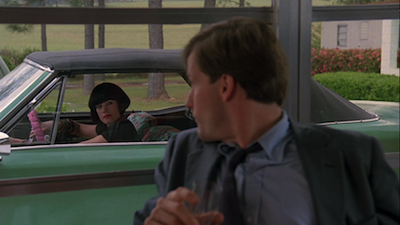
Charlie ends up on the free-love freeway, leaving job and family behind, meeting Lulu's mother, discovering her name is Audrey, pretending to be her husband, going to her high school reunion. To be fair, her real crimes are just out of sight whenever he's around, he doesn't know she's stealing and lying. That's just the thing, Charlie is oblivious. Thus, he's not going to see it when the harsh reality comes speeding at him like an oncoming truck--a simile I don't throw out just for the hell of it (it's too obvious on its own). Compare Charlie at the start of the film when he first chases Lulu across the street and nearly gets run over to the confident Charlie at the end who outwalks a city bus. In other words, traffic is a signifier!

A young Ray Liotta plays this harsh reality. He is Ray, a figure from Audrey's past and a real bad guy. He is jealous of Charlie, and so he puts his imagined rival right in harm's way. No plausible deniability if you're on camera while the convenience store gets robbed. The back and forth escalates between them, with Charlie getting the chance to play the hero, but also getting that heroism shoved back in his face. Sure, Audrey's appearance normalizes more and more as the movie progresses, but even that's a noir trope: the femme fatale is the dark-haired beauty, but the gal whom the protagonist eventually runs to is the more earthy blonde, the kind of girl who can wear a summer dress unironically. The change in either character is not so simple as just Audrey becoming grounded and Charlie letting go. Demme and Frye are working to subvert that, and even after all this time, the culmination of Ray's psychotic rage is still shocking. The climactic scenes of Something Wild are proportional in violence to the alternate feel-good image of a multicultural world that Demme builds elsewhere in the picture. The filmmaker really goes all the way in the showdown, and it's easy to forget that it's coming, to be as blind as Charlie, because the goofy romance can be real distracting.

Which is really to say that Melanie Griffith can be real distracting. Something Wild kicked off a string of truly excellent performances from the actress. Or I should say, a string of excellent performances sprinkled in with a bunch of truly bad movies. Something Wild was such a flashpoint for Griffith, it's too bad she didn't make smarter choices after it came her way. Excepting her Oscar-nominated turn in Working Girl
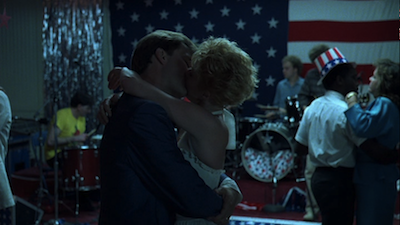
A lot of the Demme trademark touches are evident in Something Wild. He over directs the weirdness, creating characters and environments that are too quirky to ever truly breathe in the real world--Audrey's wardrobe, Audrey's apartment, Audrey--and yet he somehow makes them work. The high school reunion is one uninterrupted party with long cuts of the director's current favorite band (in this case, the Feelies) doing their thing. The humor is black, the violence is even blacker. In much the same way that Gus Van Sant was his most Van Sant-like in My Own Private Idaho, I think Something Wild is the purest form of Demme. They both might have made weirder movies and better, more substantial movies, but these choices show both of these arististc oddballs at their most peculiar and expressive. You can't imagine anyone other than Gus Van Sant making Idaho, and only Jonathan Demme could have made Something Wild.

There is a lot going on in Something Wild that went right by me all those times I watched it as a teen. While it can be appreciated as the fun yet slightly sinister romp that it is regardless, there are deeper things about growing up and wrestling with nostalgia and dealing with the person you have become vs. the person you wanted to be that only have maximum impact after you've gathered a few years under your belt. For whatever strange notions about the world that Audrey has (to describe it as her mother did), the persona she has cultivated as Lulu is meant to both hide her identity (think Ava Gardner in The Killers) but also allow her to hang on to the kind of person she imagines herself to be--a little bit of a 1920s flapper, a little Bettie Page, a little Holly Golightly. (Okay, it's easier and easier to see what an influence that this had on my young psyche. The black stockings and the dark, bobbed hair alone....) By the time she gets back to her hometown, she is presenting herself as the woman her mother would have liked to see her become. By the time Something Wild ends, however, she has morphed into the woman she was always intended to be, an Eliza Doolittle of her own design, big hat and all, heading off to the races.

This disc was provided by the Criterion Collection for purposes of review.

No comments:
Post a Comment